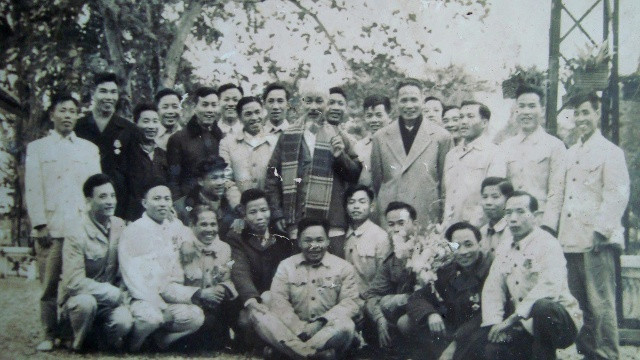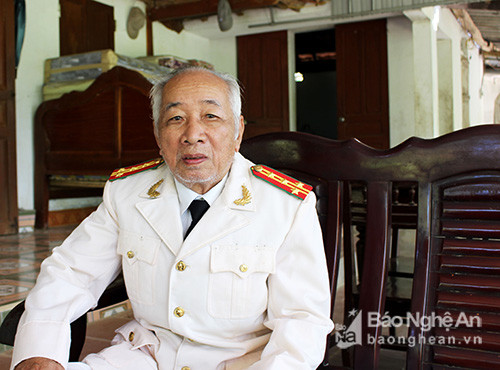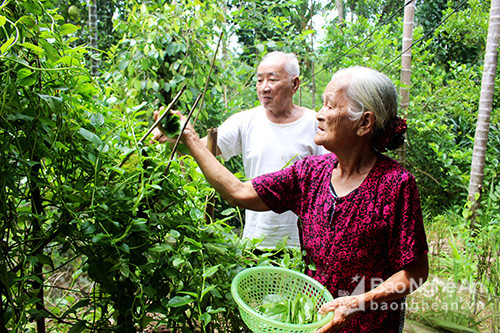Touching stories of soldiers protecting Uncle Ho
(Baonghean.vn) - More than half a century has passed, recalling the years of honor and pride as a bodyguard, serving alongside Uncle Ho, Mr. Le Dinh Uyen (87 years old) in Trung Thanh hamlet, Phong Thinh commune (Thanh Chuong) cannot help but feel moved and emotional.
After 6 years away from home, the wife just found out that her husband was working as a bodyguard.
 |
| President Ho Chi Minh and Prime Minister Pham Van Dong take a photo with guards (January 1, 1962). Soldier Le Dinh Uyen (standing 3rd from left, last row). Photo courtesy of NVCC. |
In the old wooden house in the middle of the village, Mr. Uyen and his wife still live a simple life like many other peasant families. What is special is that in the outer room of the house, there are solemnly hung photos taken at the Presidential Palace, which have been stained by time. According to Mr. Uyen, these are precious mementos that have been preserved from the days when he was Uncle Ho's bodyguard.
He and his wife got married in 1951, after that, both of them took turns serving as civilian laborers on the front lines, serving campaigns in the Northwest, Upper Laos... In early 1955, while working as the Chief of the local commune police, he received an order to study at the Central Police School (now the Security Academy) and was then assigned to work at the Guard Department, Ministry of Public Security, specifically protecting the Presidential Palace and protecting Uncle Ho.
Due to the nature of his duties in the conditions at that time, Mr. Uyen was on official duty for many years but his family still did not know what he was doing or where he was. When the land reform took place, because of suspicion that Mr. Uyen was in prison, his family was labeled as “reactionary” by the local authorities. Mr. Le Dinh Soan, Mr. Uyen’s eldest brother, was then the commune chairman and was arrested. Mrs. Phan Thi Toan, his wife, who was raising two young children, was also summoned to the reform committee to explain. Mrs. Toan recalled: “At that time, it was very tense. People kept accusing my family of being reactionary, but I firmly denied it and defended my honor to the end. I asked the reform committee, “You said my husband was in prison, so where was he being held? They were silent.”
 |
| Mr. Le Dinh Uyen in the uniform of a police colonel. Photo: Huy Thu. |
Because the local authorities labeled his family as “reactionaries,” Mr. Uyen was also transferred to another job. He said: “One evening, at midnight, I was suddenly ordered to leave the unit and stop my duties at the Presidential Palace, without knowing the reason why.” Half a year later, when he received a letter from Ms. Toan, which covered 4 pages and told him all about the suffering and injustice of his family during the land reform, he was reinstated to his job. Mr. Uyen said: “Thanks to Ms. Toan’s letter, the Department and the Ministry understood why my family was labeled as “reactionaries,” so they reinstated me.”
In March 1957, he was given leave to visit home. Following the unit's "three no's" principle (no hearing, no seeing, no knowing), he did not "reveal" any information during that visit, so his family had absolutely no way of knowing what he was doing or where he was.
Mrs. Toan shared: “When asked, he did not say anything, but when he wrote letters, he just sent them to the mailbox, so when his leave ended and he left, I only knew that he was on duty.” Until the end of December 1961, thanks to a villager working in Vinh Town who came home and told: “I saw with my own eyes that Mr. Uyen was dressed politely and neatly, going with Uncle Ho to visit his hometown.” Everyone in Mrs. Toan’s family and the whole village realized that “up until now, Mr. Uyen has been working as a soldier protecting Uncle Ho.”
Unforgettable memories of Uncle Ho
Among the many touching stories about Him, His simple lifestyle and His kind and tolerant heart are the stories that have remained engraved in him until now.
Mr. Uyen said that Uncle Ho was very active in exercising, every morning he woke up early to exercise with his colleagues. In the Presidential Palace, on Saturday evenings, there were often performances or movie screenings. Uncle Ho arrived when the team was ready and often reminded the staff to prepare candy for him to give to the children.
At that time, the place where Uncle Ho lived as well as the secretary's office, the wardrobes and documents were all made of wood, used for many years, looked old, so the office replaced them with new iron cabinets. When he returned home, seeing the new cabinets, Uncle Ho immediately asked: "Who replaced these?" The office staff came to report. Uncle Ho pointed at the guards and said: Wooden cabinets that are not broken are still good to use, the basic thing is the people. Understanding Uncle Ho's intention, the office immediately moved the wooden cabinets back to their original places.
 |
| Mr. Le Dinh Uyen and his wife are living a simple life in the house they lived in when they were poor. Despite their old age, they still take care of gardening, growing vegetables, ornamental plants, etc. Photo: Huy Thu. |
Uncle Ho lived simply, his daily meals consisted of only vegetable soup, braised fish, and sometimes rice mixed with corn. As for clothes, he often wore brown silk suits with long drawstrings, or old khakis. He had a pair of faded shorts, which the servants took to be dyed to make them “new”. When bathing, Uncle Ho would ask: “Who changed my pants?” Only when he heard the servants honestly say: “Uncle, I took them to be dyed,” did he agree.
Uncle Ho often wore a pair of rubber sandals from 1947. He often placed these sandals at the foot of the stairs in the stilt house, so that he could go up and down more conveniently. The servants saw that the soles of the sandals were worn out, so they replaced them with a new pair for Uncle Ho, and left them there, but when they saw them, Uncle Ho immediately said: "These sandals are not mine". The khaki shirt that Uncle Ho wore since the early years of the revolution, although worn out, he still did not change it, he said: "While the people and soldiers were still suffering, wearing this was classy enough". It was not until 1959, during a business trip abroad, that Uncle Ho agreed to wear a new khaki shirt".
Mr. Uyen remembers one time, Uncle Ho and everyone were preparing to leave the agency to visit a locality. Before leaving, a soldier named Song (from Nghe An) was wearing a pretty shirt. As soon as he saw him, Uncle Ho reminded him: "You are not wearing this appropriately." Then Uncle Ho said: "In the long run, it is okay, but at this time the country's situation is still difficult, the people are still hungry and suffering, dressing like that is strange to the people. If we are not close to the people, how can we work?" He and his comrades always remember Uncle Ho's teachings for life.
The two times Uncle Ho visited his homeland (1957, 1961), Mr. Uyen was present in the bodyguard group. The 8 years working closely with Uncle Ho, for Mr. Uyen, "those were the most honorable and proud days of my life".
Retiring in 1990, the police colonel always advised himself and his children to live as Uncle Ho taught: "Try to do whatever is beneficial to the people, no matter how small, and try to avoid whatever is harmful to the people, no matter how small."
Huy Thu
| RELATED NEWS |
|---|

